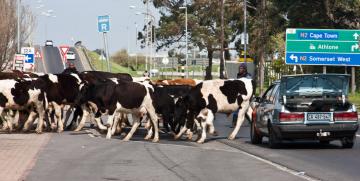
Cattle in Cape Town (by Noleen Kutash)
Dr Thomas Cousins
(Wellcome Trust collaborative award with Dr Maan Barua, Dr Michelle Pentecost, Dr Jamie Lorimer, and Prof Sushrut Jadhav)
Many of the urban poor in the global south rely on animals for their livelihoods. Yet complex relations between animals, informal livelihoods and health have received scant systematic theoretical and applied attention in the social sciences. The Urban Animals project, funded by a Wellcome Trust Seed Award in the Humanities and Social Sciences, examined questions on the urban poor and their relations with animals in New Delhi and Cape Town. It explored health implications emerging from these trans-species arrangements and the management responses they provoke.
In New Delhi, India, there are 0.36 million livestock, largely reared by marginalized caste communities in urban shantytowns. Similarly, livestock-keeping in Cape Town, South Africa, is an important livelihood activity for poor and working class black residents in informal settlements. Both cities have large populations living under economic deprivation and social exclusion. Animals provide economic support for the disenfranchised but also pose significant health risks. Understanding the complexity of human-animal dynamics provides insights into urban livelihoods, health and its management. Yet, trans-species approaches bridging animals, human livelihoods and health is scant. We aim to respond to this pressing limitation by departing from scholarship fragmented by the anthropocentricism of urban studies and rigidity in interdisciplinary boundaries. It situates livelihoods and health as trans-species interactions, cutting across human-animal divides.